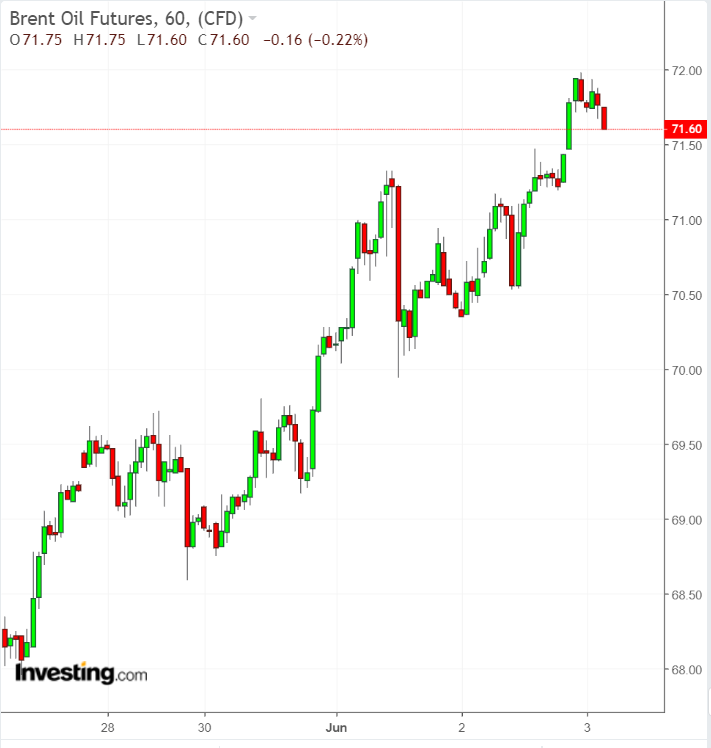The price of Brent saw a welcome jump up above $70 per barrel this week, just in time for the OPEC+ meetings. There was probably no one happier to see these higher prices this week than the Russian government and other OPEC+ members who were looking to secure higher production numbers.
They got their wish, as OPEC+ decided to proceed with already negotiated plans to raise output this spring and summer by 2.1 million bpd. This means that in July, production should increase by 450,000 bpd.

The New OPEC+ Normal
Jumping on the teleconferencing bandwagon, proven successful during to the coronavirus pandemic, OPEC+ will now meet monthly to adjust production rates to the market. Whereas once OPEC oil ministers made a point of setting policy for six months or longer, and refusing to overreact to price changes, OPEC+ now prefers to adjust its decisions on a regular basis, depending on the market.
Whether the new OPEC+ strategy works well for member nations is irrelevant for oil traders. What is relevant is that it makes OPEC+ decisions less determinative of pricing.
As has been the case for some time now, the real market force is currently demand. If OPEC+ or others were to drastically overproduce leading to excess inventory (like we saw with OPEC in 2015), prices would plummet.
Instead, OPEC+ is continuing to carefully control its output with gradual increases spread over several months. However, the real issue for the market and prices right now is not supply or production rates. The real issue is demand, and right now the market thinks demand is on the rise as the world continues to reopen from coronavirus restrictions.
Saudi Aramco’s Production Capacity
At the OPEC+ press conference, Saudi oil minister Abdulaziz bin Salman addressed growing concerns about activist investors and others putting pressure on big oil companies to limit investment in new oil and gas resources for the sake of the environment.
He explained that Saudi Arabia does not share these concerns and is currently working to expand its production capacity from 12 million bpd to 13 million bpd. When questioned, he said, “don't be surprised if we come back with additional announcements,” cryptically insinuating that Aramco (SE:2222) might be looking to raise its production capacity above 13 million bpd. However, he refused to provide any further details, fueling speculation.
For years, Aramco has had the ability to produce at 12 million bpd, a rate which the company is required to be able to achieve and maintain by law. According to the Saudi Hydrocarbon Law, Aramco must be able to reach its maximum sustained capacity (MSC) within three months of orders from the government and hold that level of production for a year.
In April 2020, the government impulsively ordered Aramco to increase production to 12 million bpd, its MSC. This resulted in a strategic problem, because it meant Saudi Arabia no longer had any spare capacity in case of any disruptions (such as potential rocket or drone attacks from Iran or Yemen).
When the Saudi government realized this problem, it ordered Aramco to make the necessary investments to reach 13 million bpd of MSC, meaning Aramco had to work toward that level of capacity. Aramco has been doing just that, but as far as is known, Aramco has not yet produced more than about 12.1 million bpd.
In truth, there is no good reason for Aramco to increase its MSC beyond 13 million bpd. It would be difficult, time consuming and expensive to increase MSC beyond 13 million bpd.
And, most importantly for traders, if Aramco did increase its MSC beyond 13 million bpd, there is no indication Aramco would ever produce over 13 million bpd. The talk about Aramco increasing its production capacity over the 13 million bpd mark is not valuable information for the market at this time.
Iranian Oil Exports
OPEC+ decided not to address the potential return of Iranian oil to the market since nuclear talks between the U.S. and Iran were extended. It is now expected that Iranian oil may not reach the market, legally, until August at the earliest but more likely sometime at the end of Q3.
Depending on how the negotiations progress, OPEC+ will likely have to provide some guidance to the market as to how it plans to reintegrate Iranian production to the market at its July or August meetings.
